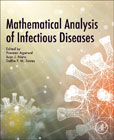
Mathematical Analysis of Infectious Diseases
Agarwal, Praveen
Nieto, Juan J.
Torres, Delfim F.M.
Mathematical Analysis of Infectious Diseases updates on the mathematical and epidemiological analysis of infectious diseases. Epidemic mathematical modeling and analysis is important, not only to understand disease progression, but also to provide predictions about the evolution of disease. One of the main focuses of the book is the transmission dynamics of the infectious diseases like COVID-19 and the intervention strategies. It also discusses optimal control strategies like vaccination and plasma transfusion and their potential effectiveness on infections using compartmental and mathematical models in epidemiology like SI, SIR, SICA, and SEIR. The book also covers topics like: biodynamic hypothesis and its application for the mathematical modeling of biological growth and the analysis of infectious diseases, mathematical modeling and analysis of diagnosis rate effects and prediction of viruses, data-driven graphical analysis of epidemic trends, dynamic simulation and scenario analysis of the spread of diseases, and the systematic review of the mathematical modeling of infectious disease like coronaviruses. Offers analytical and numerical techniques for virus models Discusses mathematical modeling and its applications in treating infectious diseases or analyzing their spreading rates Covers the application of differential equations for analyzing disease problems Examines probability distribution and bio-mathematical applications INDICE: 1. Spatiotemporal Dynamics Of The First Wave Of The Covid-19 Epidemic In Brazil Marat Rafikov, J.M.V. Grzybowski and Roberto Valmir Da Silva 2. Transport And Optimal Control Of Vaccination Dynamics For Covid-19 Delfim F. M. Torres, Mohamed Abdelaziz Zaitri and Mohand Ouamer Bibi 3. COVID-19's Pandemic: A New Way Of Thinking Through Linear Combinations Of Proportions Cristiana J. Silva, Juliana Dias Reis, Adelaide Freitas and Sara Escudeiro 4. Stochastic Sica Epidemic Model With Jump L'Evy Processes Delfim F. M. Torres, Houssine Zine and Jaouad Dananeb 5. Examining The Correlation Between The Weather Conditions And Covid-19 Pandemic In Galicia Luca Piccotti Sr., Guido Ignacio Novoa Flores and Juan J. Nieto 6. A Fractional-Order Malaria Model With Temporary Immunity Ram Singh and Attiq Ul Rehman 7. Parameter Identification In Epidemiological Models Ana Carpio and Emile Pierret 8. Lyapunov Functions And Stability Analysis Of Fractional-Order Systems Adnane Boukhouima, Houssine Zineb, El Mehdi Lotfia, Marouane Mahroufa, Delfim F. M. Torres and Noura Yousfi 9. Some Key Concepts Of Mathematical Epidemiology Jaafar El Karkri and Mohammed Benmir 10. Analytical Solutions And Parameter Estimation Of The Sir Epidemic Model Dimiter Prodanov 11. Global Stability of a Diffusive SEIR Epidemic Model with Distributed Delay Abdesslem Lamrani Alaoui, Moulay Rchid Sidi Ammi, Mouhcine Tilioua and Delfim F. M. Torres 12. Application Of Fractional Order Differential Equations In Modeling Viral Disease Transmission Shahram Rezapour and Hakimeh Mohammadi 13. Role Of Immune Effector Responses During Hcv Infection: A Mathematical Study Fahad Al Basir and Amar Nath Chatterjee 14. Modeling The Impact Of Isolation During An Outbreak Of Ebola Virus Disease Amira Rachah 15. Application Of The Stochastic Arithmetic To Validate The Results Of Nonlinear Fractional Model Of Hiv Infection For Cd8+T-Cells Samad Noeiaghdam and Denis Sidorov 16. Existence Of Solutions Of Modified Fractional Integral Equation Models For Endemic Infectious Diseases Hemant Kumar Nashine, Rabha W. Ibrahim and Reena Jain 17. Numerical solution of a fractional epidemic model via general Lagrange scaling functions with bibliometric analysis Yadollah Ordokhani and Sedigheh Sabermahani
- ISBN: 978-0-323-90504-6
- Editorial: Academic Press
- Encuadernacion: Rústica
- Páginas: 300
- Fecha Publicación: 01/06/2022
- Nº Volúmenes: 1
- Idioma: Inglés
